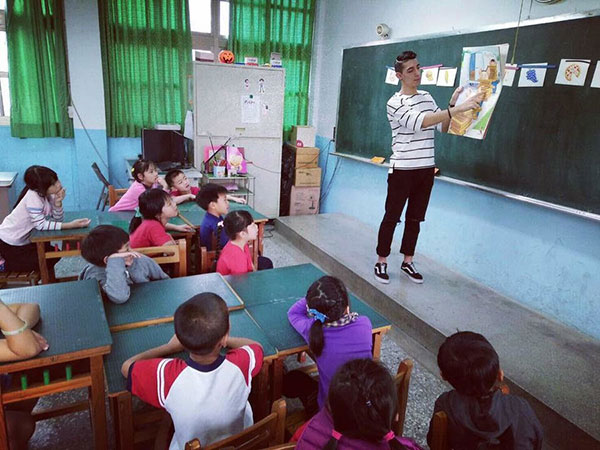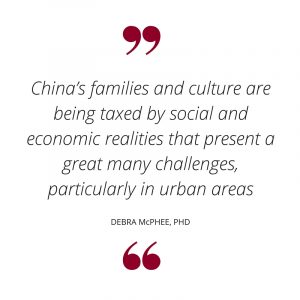Erik Angamarca needed a backup plan. He had studied in Beijing during his junior year at Fordham and loved it—the food, the culture, the people. Passionate about travel and public service, multilingual, and long set on joining the U.S. diplomatic corps, he applied to the State Department’s Thomas R. Pickering Foreign Affairs Fellowship Program in pursuit of his dream.
The program turned him down.
“I was sort of bummed,” Angamarca says. “My ‘Plan A’ was to apply for the Foreign Service.”
He went on to graduate from Fordham in 2014 with a degree in international political economy and a minor in Mandarin Chinese. Looking back, he realizes he wasn’t quite ready—but he also wasn’t prepared to give up.
So, the summer after graduation, he applied on a whim to teach English in South Korea through the Council on International Educational Exchange. “I didn’t know one word of Korean, but I’d just been to China and China was great,” he says. “I thought, ‘Let me get that experience overseas and learn more about Asia.’”
And learn he did. During his two-year teaching stint, Angamarca spent four months exploring East Asia—backpacking through the Philippines, Hong Kong, Vietnam, Thailand, Laos, Cambodia, and Indonesia. He lodged in temples and volunteered at an elephant sanctuary.
The experience paid off. Late last year, Angamarca earned a Charles B. Rangel International Affairs Graduate Fellowship, which will support his training for the Foreign Service. He recently began graduate studies at Georgetown University.
An Early Interest in Diplomacy
Angamarca wants to become an ambassador, and even though he’s years away from that goal, he has already gotten a few tastes of what it’s like to represent America abroad. He got the travel bug at age 10, after leaving New York to spend two years in his parents’ native Ecuador, where he realized that he liked trying new things (roasted guinea pig, anyone?) and first envisioned himself as a diplomat.
“Even at that age, you get a lot of questions,” recalls Angamarca, whose flawless manners and quiet self-assurance seem like a natural fit for a career in diplomacy. “‘How is New York?’ ‘What does snow feel like?’ Teaching them about Thanksgiving. I didn’t know until years later that I was representing the U.S.”
Another experience followed his adventures in South Korea and East Asia. After returning to the U.S. in 2016, he reconnected with Fordham’s Office of Prestigious Fellowships, which helped him earn a Fulbright English Teaching Assistantship to Taiwan. He spent the 2017–2018 academic year there, not only teaching English to grammar school students but also introducing them to American traditions like Halloween costumes and candy canes.

As he pursues his studies at Georgetown on the Rangel fellowship, supporters have cheered him on, including his parents, his younger sister, and Patricia Scroggs, a retired Foreign Service officer who directs the Charles B. Rangel International Affairs Program. She’s known Angamarca since he participated in the organization’s undergraduate scholars program.
“From the time I met Erik, I thought, he is such a natural diplomat, is interested in so many things, and interacts so well with people,” says Scroggs, also noting his adaptability and resourcefulness. “He has done the kinds of things he’ll be called upon to do as a Foreign Service officer.”
When Angamarca applied for this year’s Rangel fellowship, which provides full financial support for the two years of diplomatic studies, he was one of 30 people chosen from among 550 applicants.
“I’m already planning to be there at his ambassadorial swearing-in ceremony,” says Scroggs, seeing into the future, to the culmination of Angamarca’s dreams.
He’s on track to graduate in 2020 and must stay in the diplomatic corps until at least 2025.
“I’ve always told the director it’s not a five-year commitment for me,” Angamarca says. “I definitely want to stay in the Foreign Service for a while. It’s needed now more than ever.”
—Julie Bourbon
]]>This past January, GSS formed an additional partnership with the Beijing University of Technology.
Under the new partnership, students from CYU will earn a bachelor’s in social work from Fordham and, should they choose, would also continue on for a master’s. Fordham students get a summertime opportunity in China where they can choose between two three-credit courses while becoming familiar with the culture.
they choose, would also continue on for a master’s. Fordham students get a summertime opportunity in China where they can choose between two three-credit courses while becoming familiar with the culture.
“It’s about bringing Chinese students to experience one of the most vibrant cities in the world and learn professional skills at Fordham that they can bring back home to have a positive effect,” Debra McPhee, PhD, dean of GSS.
After the Cultural Revolution, social work practice was not permitted in China, said David Koch, PhD, associate professor and director of the bachelor’s degree program in social work. He said that it was only in the 1990s that social work practice began to be taught again at universities.
“Like anywhere in the world, China’s families and culture are being taxed by social and economic realities that present a great many challenges, particularly in urban areas,” said McPhee.
Over the next 20 years China will need to employ approximately 2 million social workers to deal with the needs of a massive population and an “explosion in urban economy,” she said.
Koch, who taught at the last two summer sessions at CYU, said that while Beijing’s population of 21 million may impress, it pales in comparison to the megacity that the government plans to link together with bullet trains over the next decades.
“Beijing will be at the center of 130 million people, and that will affect how services are delivered,” he said. “That environment will require a different kind of practitioner. We’re helping to develop that.”
“We want to help China increase its effectiveness in helping people,” he said. “And in site visits with CYU and Fordham students, we really see what’s happening on the ground; it’s not just the 30,000-foot view.”
Koch said the local governments are far more forthcoming than in the past in revealing and confronting issues such as HIV, undersupervised migrant youth, and care for the elderly. Such a shift will be beneficial, especially on the growing professionalization of social work.
“What we’re seeing in the universities is an attentiveness to what social work can give them, something which in the past they couldn’t utilize,” he said.
“In these kind of partnerships there’s always a benefit on both sides,” said McPhee. “It’s about building bridges.”
There will be several information sessions in March for Fordham students interested in taking a three credit course in Beijing. For more information contact David Koch at [email protected].
]]>“I didn’t have that many opportunities myself, so I know firsthand that if we provide education and opportunities for disadvantaged kids, it will make a difference in their lives,” he said.
Whether the cohort is underserved communities of New York City or rural-to-urban migrant families in China, Zhai provides quantitative analysis of survey data in the hopes of affecting policy.
Most of his research has focused on disadvantaged children in the United States. However, the native of China has begun to delve into childcare and education issues in his home country with a focus on migrant workers in Beijing.
He has been working with researchers from five universities in Beijing to collect data on family resources, migration experiences, and parents’ views on traditional values, child rearing, and education practices. He is also gathering data on children’s school experiences and developmental outcomes.Zhai described a country in the midst of extraordinary transformation, but still rooted in some ancient traditions, such as Confucianism, which fosters a preference for sons in a family. He said that traditionally boys, especially eldest sons, have been given more opportunities to succeed. China’s former one-child policy has further influenced the preference.
The one-child policy was implemented differently across the urban-rural divide, with cities strictly enforcing the policy and many rural areas allowed more than one child, especially if the first one was a girl.
Even though the recent phase-out of the one-child policy will free couples from the pressure to have sons, Zhai’s research shows that boys will still be favored compared to their female siblings when it comes to education and opportunities.
Part of the reason, he said, is because China doesn’t have an established pension system; instead the country still largely relies on traditional values where children, especially the eldest son and his spouse, take care of their parents in old age.
“It’s very complicated to shift from the traditional values to a new system,” said Zhai. “That’s why I want to see through data if girls are discriminated of investment in their education and if they are at a disadvantage.”
Zhai’s work also examines the effects of the country’s urban vs. rural services. In the planned economy, urban residents were provided with better services than rural residents, including child education, he said. Even today, Chinese citizens must register with the government as an urban or rural household status.
China’s “Rural” Status
Even as millions of rural residents move to the cities for better opportunities, their “rural” household registration status stands, thereby preventing their children from participating in the city’s formal school system.
“The parents can’t receive several social benefits and their kids can’t go to the public schools,” said Zhai. “It’s a huge problem.”
He said that many of the “rural” migrant communities that live in the cities have started informal schools, but most teachers don’t have proper training. And the problem may intensify, as many expect there to be a baby boom over the next decades now that the one-child policy has lifted.
Zhai said that there are a lot of efforts in China being undertaken to reform the system, and he hopes that his studies will provide solid evidence from data analysis supporting more change.
“The good part of being an outsider is that I can see the system from afar and analyze objectively,” said Zhai.
“But the truth is I know this from both sides, inside and out.”
]]>